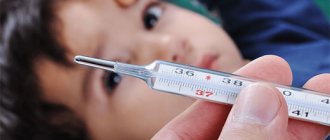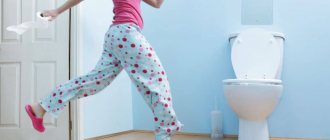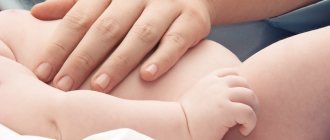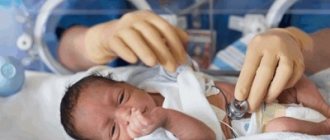Irritable bowel syndrome
This disease was discovered relatively recently. This is due to the fact that the disease itself is a consequence of improper functioning of the intestines for no apparent reason. Disturbances in the functioning of the rectal mucosa appear due to many factors. In the case of IBS, the cause is frequent stress and nervous tension.
It is a disorder of the autonomic nervous system that causes the basic mechanics of the gastric tract to become disrupted. The person experiences diarrhea or constipation. Scientists note that IBS is observed in every 4th patient suffering from unstable stool. The disease may be hereditary. In addition to the main cause – nervous system disorders, there are a number of additional factors that influence IBS:
- poor nutrition;
- excessive alcohol consumption;
- frequent consumption of fatty foods;
- excessive consumption of sweets, especially chocolate;
- passive lifestyle.
With IBS, the patient suffers from animal colic and flatulence. There are problems with stool. In particular, he may be bothered by frequent changes in constipation and diarrhea.
Stress is a top priority when a patient is diagnosed with IBS. According to statistics, 60% of patients suffering from this disease felt mental illness. TFR is detected in both men and women. But representatives of the weaker sex are at risk of the disease much more often. Doctors associate this factor with the structure and functioning of the female hormonal system. Children also become victims of IBS. But it is often mistaken for dysbiosis and no treatment is prescribed. Experienced doctors associate the chronic manifestation of the disease in adults with the lack of timely therapy in childhood.
IMPORTANT: At the first signs of stomach upset in a child, you should visit a pediatrician. It is important to assess the “psychological climate” in the family. If a child is often punished by adults and complains of abdominal pain, it is worth changing the line of education to a softer one.
Why does this condition occur?
When a person experiences either diarrhea or constipation and both symptoms follow each other, this causes reasonable bewilderment. These two phenomena are opposite disorders and seem incompatible. Everyone knows what to do if a child has diarrhea, or, conversely, his stool has become too dense. But when conditions alternate, it is difficult to decide what measures to take.
It is necessary to highlight the main reasons due to which constipation is possible, then diarrhea, and vice versa:
- irritable bowel syndrome;
- enterocolitis;
- intestinal obstruction;
- dysbacteriosis;
- appendicitis;
- cholecystitis.
Indigestion followed by constipation can occur during pregnancy, which indicates normal hormonal changes.
It is worth taking a closer look at each of the reasons why unstable stool may develop.
Irritable bowel syndrome
For this reason, alternating diarrhea and constipation more often occurs in women. About 40% of the fairer sex suffer from loose bowel movements caused by irritable bowel syndrome. In men, this phenomenon occurs only in 15% of cases. The disorder most often develops among the population aged 20 to 60 years. It is diagnosed extremely rarely in children and the elderly.
Irritable bowel syndrome is neurological in nature. Digestive disorders develop under the influence of stress, anxiety and anxiety. A change in the condition of the stool can even cause lack of sleep and lack of a normal life schedule.
Factors predisposing to the development of the syndrome:
- poor nutrition;
- frequent snacking;
- passive lifestyle;
- the presence of internal chronic pathologies;
- hormonal imbalances.
People who are overly emotional are more likely to experience irritable bowel syndrome than those who lead more balanced and calm lives. Pregnancy can trigger the syndrome.
Getting rid of irritable bowel syndrome can be difficult. This diagnosis is made only by a doctor after long-term observation of the patient. First, all possible diseases of the digestive system are excluded. If there are no pathologies, and severe diarrhea after constipation periodically bothers a person for three years, the diagnosis of irritable bowel syndrome is considered confirmed.
Enterocolitis
Enterocolitis is an inflammatory disease in which the large and small intestines are simultaneously affected by the pathological process. The symptoms of the disease are as follows:
- abdominal pain;
- frequent urge to defecate;
- the stool is mostly liquid with small fragments of dense feces.
A person with enterocolitis can visit the toilet up to 5–7 times during the day. It is very important to find out the true causes of diarrhea of this kind, since prolonged violation leads to unpleasant consequences. The patient may develop anemia, dystrophy and severe lack of nutrients in the body.
Intestinal obstruction
This is a very dangerous disorder, which can also cause severe diarrhea after constipation. Intestinal obstruction develops against the background of the following factors:
- severe muscle spasm;
- tumor growth;
- formation of adhesions;
- appearance of scars.
Because of all this, the movement of food through the digestive tract becomes impossible. The process stops. Food begins to rot, causing severe inflammation.
Gradually, the diseased area of the intestine stretches and necrosis begins. This condition can lead to peritonitis, and if help is not provided, even death.
Dysbacteriosis
This problem causes constipation, which turns into diarrhea in infants. The state of health is complicated by intestinal colic and bloating.
Young children experience irregular stools. The discharge may contain large amounts of mucus that is released in the intestines when the balance of bacteria is incorrect.
Appendicitis
Another acute condition requiring emergency surgical care. With appendicitis, a person initially feels pain on the right side, severe nausea, and vomiting. Acute diarrhea begins.
After some time, the release of feces stops and constipation begins. The patient experiences severe pain in the right iliac region. This stage lasts about 12 hours. Without immediate assistance, peritonitis and death may occur.
Cholecystitis
Diarrhea after constipation in an adult can develop with cholecystitis. Both symptoms occur alternately. Most often, this disease develops in women.
Other reasons
The following factors can provoke the development of unpleasant symptoms:
- undergone surgery on the stomach;
- frequent and severe intestinal spasms;
- dehydration that occurs after prolonged diarrhea;
- violation of the composition of intestinal microflora;
- lack of nutrition for some time, which is associated with loose stools, and there is simply no feces in the intestines;
- slowing down intestinal motility;
- severe chronic illness;
- stressful situation;
- long-term use of non-steroidal painkillers;
- overdose of laxatives or restorative medications.
There is always a risk of developing the so-called “fecal impaction”. It occurs against the background of lazy bowel syndrome and is the formation of dry feces, which blocks the movement of masses. The symptom occurs when drugs that have a laxative effect are suddenly discontinued. Since the intestines are accustomed to the action of the pills, their sudden withdrawal leads to unpleasant consequences.
Severe disturbances in the digestive system can occur in pregnant women, the elderly and young children with uncontrolled use of drugs to loosen or consolidate stool.
Enterocolitis
This is a disease that occurs due to irritation of the mucous membrane of the rectum and small intestine. It can be either infectious or inflammatory. It occurs in acute or chronic form. Often the acute phase of enterocolitis is associated with the manifestation of gastritis.
The development of acute enterocolitis can occur due to an allergic reaction. The body can also cause a protective reaction in the form of illness when poisons or toxic substances enter the gastrointestinal tract. The main difference between this phase of the disease and the chronic course is damage to the upper part of the intestinal mucosa.
The chronic stage of enterocolitis is characterized by deep-seated lesions of the mucosa, including the intestinal muscle tissue underneath. These are pathological processes that disrupt the normal functioning of the gastrointestinal tract. There are stages of remission and acute phase. The patient suffers from digestive disorders and suffers from constipation and diarrhea. They can alternate or follow each other.
Doctors identify several main reasons for the development of the disease:
- bacterial infection;
- parasites;
- poor nutrition;
- poisoning by poisons or dangerous chemicals;
- manifestations of the disease as a consequence of pathology in other human organs.
The disease manifests itself quickly and acutely. The patient feels unwell. The body temperature rises and a coating forms on the tongue. Vomiting and bouts of diarrhea are possible. Blood and mucus discharge can be found in the stool.
Other reasons
Both constipation and diarrhea are common symptoms of various pathologies and dysfunctions of the organs of the epigastric space. There are other causes of stool instability that are non-pathological in nature:
- recent operations (gastric or intestinal resection, colotomy);
- removal of intestinal polyps;
- late pregnancy;
- the result of long-term drug therapy;
- side effects from long-term diets;
- features of intestinal anatomy (congenital anomalies).
To exclude non-pathological factors, it is enough to adjust the diet. Abnormal bowel movements are possible after childbirth during the first months. After a full examination and obtaining reliable, extensive diagnostic data, it is possible to finally determine the diagnosis and identify the true cause of the bowel disorder.
Rectal tumor
This disease is considered one of the most dangerous in the world. A tumor can be malignant or benign. It develops on the walls of the rectum and is a heterogeneous group of neoplasms. They differ in their histostructure, as well as the dynamics of development and clinical picture.
ATTENTION: Doctors note a dangerous trend. Over the past two years, mortality from colorectal cancer has increased several times. The number of deaths from rectal tumors exceeds all deaths among other cancers. Doctors advise not to disdain visiting a gastroenterologist at the first signs of illness, and also to monitor your personal diet.
The formation of a benign or malignant tumor is a consequence of the manifestation of third-party diseases. Frequent “catalysts” of tumors are rectal polyps, cysts, ulcers and bedsores. Human heredity plays a major role in the occurrence of cancer. Sometimes oncology occurs against the background of constant mechanical damage to the intestinal walls. This clinical picture can be observed in patients suffering from frequent constipation.
Rectal cancer is accompanied by diarrhea and constipation. They alternate one after another. Moreover, it is diarrhea that manifests itself primarily. It is the first dangerous “bell” on the path of tumor development. After stool disorder comes stool obstruction and constipation. These symptoms are a consequence of third-party diseases that accompany oncology, rather than its root cause.
our team
Yulia Sergeevna Apenchenko Gastroenterologist, Candidate of Medical Sciences, Associate Professor, Chief Pediatric Gastroenterologist of the Ministry of Health of the Tver Region, doctor of the highest category
Barashkov Alexander Petrovich Endoscopist, doctor of the highest category
Basalaeva Natalya Vasilievna Endoscopist, pediatric gastroenterologist, Candidate of Medical Sciences
Gurienkova Victoria Anatolyevna Gastroenterologist
Kovtunova Natalya Petrovna Gastroenterologist, head of the somatic-neurological department of the day hospital of City Clinical Hospital No. 6
Kononova Alla Gennadievna Gastroenterologist, Candidate of Medical Sciences, Associate Professor, doctor of the highest category
Naumova Svetlana Nikolaevna Endoscopist
Nevskaya Irina Vladimirovna Endoscopist, doctor of the highest category
Novikova Anastasia Sergeevna Gastroenterologist
Tatarinov Andrey Petrovich Endoscopist, doctor of the highest category
Fomina Lyudmila Arturovna Gastroenterologist, Candidate of Medical Sciences, Associate Professor, doctor of the highest category
Pulls in the lower abdomen
If the lower abdomen is tight, the reasons can be explained by natural physiological processes, but can also be harbingers of serious diseases.
Gastritis: causes, symptoms, treatment
Gastritis is a dangerous disease of the stomach that leads to erosion of the mucous membrane, increased or decreased acidity, and the appearance of ulcers.
Bloating: causes, symptoms, treatment
Almost every person is familiar with such an ailment as bloating. A similar phenomenon in clinical gastroenterology is called intestinal flatulence.
License No. LO-69-01-001044 dated 05.23.2013
Tver, st. Zhelyabova, 75 View on map
Often, with the current rhythm of life, we are always in a hurry and forget about our health, but the body gives signals. One of the reasons to think and get examined is when going to the toilet, either constipation or diarrhea and vice versa. There are several reasons for this condition, from harmless ones, which can be eliminated by adjusting your diet, to very serious ones, even death. In this article we will talk in detail about all possible causes and ways to resolve them.
When you need specialist help
In all of these cases, the help of a doctor is necessary in the early stages. The very first signs of intestinal disease should prompt a person to immediately contact the clinic. However, diagnostic methods for each disease will be different:
- In case of TBS, the patient should visit a gastroenterologist. At the appointment, it is important to point out that disorders occur in certain dynamics. Experienced physicians have established a dependence on stool disorders in patients with MS. It is believed that the diagnosis will most accurately reflect this disease if intestinal disorders occur at least 3 times a week for 3 months. It is also worth noting that the primary diagnosis may not show pathological changes at all according to test results. It is precisely this factor that is the main indicator of the manifestation of TFR.
- Diagnosis of enterocolitis includes examining the patient using rectoscopy. The patient must also undergo a stool test for bacteriological examination. Often, epidemiological analysis data is sufficient to make a diagnosis. Even more information confirming this diagnosis will be provided by a study of the results of a colonoscopy.
- Diagnosing rectal cancer is the most difficult. At the initial stages of development, it can be confused with diseases with similar symptoms. The last phases of the disease are often diagnosed, in which therapy is ineffective. For the most accurate diagnosis, it is necessary to undergo a series of tests and conduct a thorough examination. The main methods include: biopsy, sigmoidoscopy, histological and pathohistological examination of tissues. Ultrasound and CT data are used to visualize the tumor. Primary signs of the disease can be determined by palpation. During a comprehensive examination for oncology, the patient undergoes a general blood and urine test.
If the results of tests and diagnostics give a disappointing prognosis, you should immediately consult a doctor.
Diagnostics
It is possible to determine exactly what caused the development of indigestion only after consulting a doctor. Patients must undergo the following examinations (in combination or those recommended by a specialist):
- Take blood tests (biochemical and general) and urine tests.
- Make a coprogram.
- Perform esophagogastroduodenoscopy.
- Get a CT scan (computed tomogram) of the abdominal cavity.
- Do a colonoscopy (including a computer one).
- Perform endoscopy.
Patients are advised to visit not only a gastroenterologist, but also a proctologist, who should determine whether rectal pathologies are causing constipation and diarrhea in an adult at the same time.
What to do if you have unstable stools?
Unstable stool may be the result of a temporary intestinal or stomach disorder. The body reacts to temporary difficulties and includes protective reactions that manifest themselves in a similar way. In this case there is no threat to health. The most important aspect when the first signs of a gastrointestinal disorder appear is the persistence and dynamics of the disease. If diarrhea or constipation does not go away for more than 3 days or is cyclical, you should visit a doctor.
When a patient experiences either diarrhea or constipation, you should not advise him on a course of self-medication. This can significantly worsen his condition or cause complications in all organs of the gastrointestinal tract. In severe forms of the disease, it is worth giving up physical and emotional stress.
If constipation and diarrhea are accompanied by nausea
During constipation or diarrhea, a deterioration in general well-being is very often observed. This occurs against the background of poisoning of the body with toxins or disturbances in the water-salt balance.
Nausea is the main symptom of irritable bowel syndrome. At the same time, other diseases of important organs and systems should not be excluded. All questionable symptoms must be assessed comprehensively and only in a clinical setting.
So, if any alarming signs appear, you should immediately make an appointment with a doctor to exclude a possible deterioration in your health in the future.
Features of treatment
In the hospital, a patient suffering from stool disorder is prescribed antidiarrheal or laxative medications. Depending on what stool disorder a person is suffering from at a given time. The entire course of therapy is aimed at eliminating the causes of the disease. In some cases, surgery is required.
When treating unstable stools, certain recommendations should be followed:
- Avoid fried and fatty foods. Stick to a therapeutic diet.
- Don't do hard work. Limit physical activity.
- Spend more time walking in the fresh air. Drink clean water.
- Do not create emotional and mental stress. Isolate yourself from stressful situations.
What foods can patients eat if they are constipated after diarrhea?
To restore the functioning of the digestive organs, you need to exclude smoked and spicy foods from the menu. You will have to give up your favorite sweets and flour products. The prohibited list includes foods that cause fermentation in the intestines.
Include fresh fruits and vegetables in your diet. They contain a large amount of plant fibers that stimulate the digestive system. This will help get rid of the remnants of food rotting in the colon.
To get rid of constipation, you need to eat raisins and dried apricots.
Drinks that can cause constipation include coffee and alcohol.
Instead of the usual cup of coffee, it is better to drink herbal infusion or green tea.











